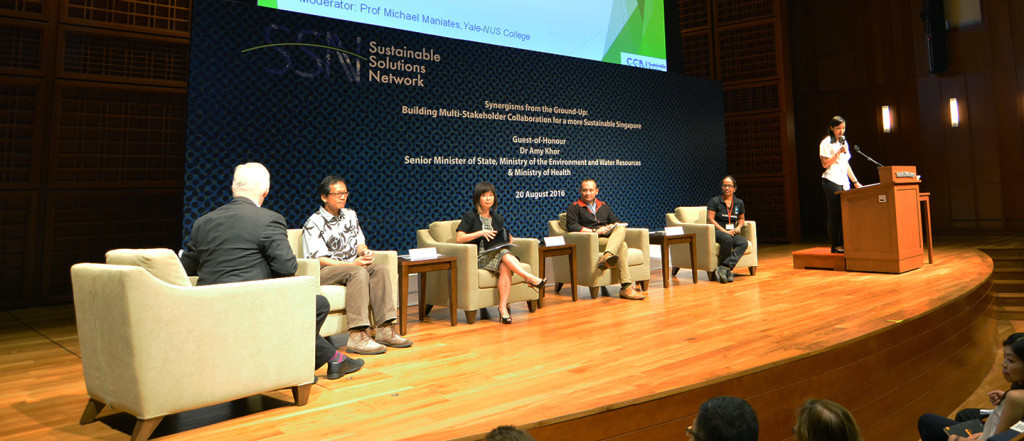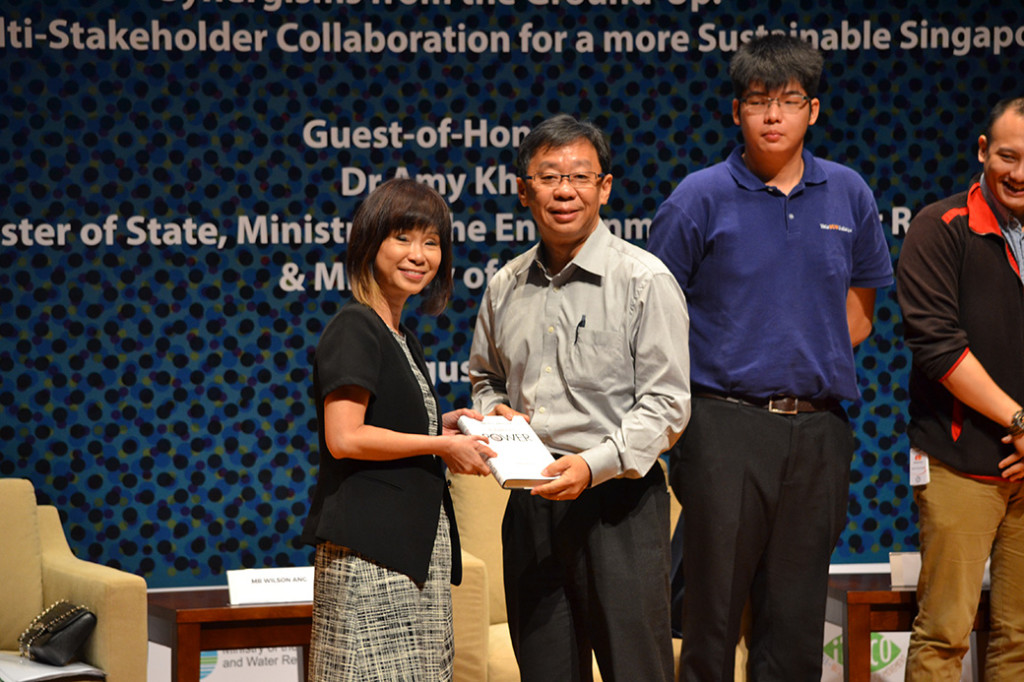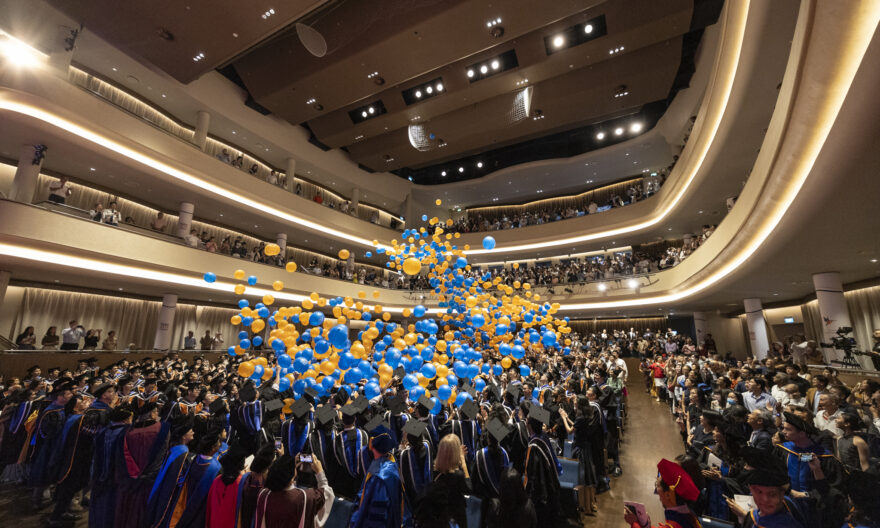Students launch Sustainable Solutions Network to promote collaboration among environmental stakeholders

On 20 August 2016, the inaugural Sustainable Solutions Network (SSN) conference was organised by I’deCO, Yale-NUS’ first sustainability student organisation. The SSN aims to bring together all the stakeholders concerned with sustainability in Singapore, including students from tertiary institutions and representatives from the public, private and non-profit sectors.
There are two components to the SSN: an annual flagship conference and an online networking platform where stakeholders can engage with each other and build on their ideas for collaboration beyond the conferences.
The conference opened with an address by Guest-of-Honour, Dr Amy Khor, Senior Minister of State, Ministry of Environment and Water Resources & Ministry of Health, who spoke on social innovation and collaboration in the environmental scene. She urged local companies to make it more rewarding for the public to go green.
“Awareness is a start, but awareness will not achieve our sustainable development goals – it has to translate into actions,” said Dr Khor. “I think the government cannot do this alone and NGOs (non-governmental organisations) have to come in to work with community organisations to initiate recycling programmes and events, educate the people, and also to encourage them to [participate].”

Executive Vice President (Academic Affairs) Tan Tai Yong presents the Guest-of-Honour, Dr Amy Khor, with a token of appreciation from the College
According to Tan Weiliang (Class of 2018), chairperson of the organising team, the initial concept for the network was developed over summer in 2015 when he travelled with Jeffrey Tong (Class of 2018) to three Scandinavian countries on a Social Impact Fellowship. This Fellowship is offered by Yale-NUS’ Centre for International and Professional Experience (CIPE), and encourages students to pursue independent or group projects that will help them learn and contribute to the community. Both Weiliang and Jeffrey are part of I’deCO, a team of Yale-NUS students with varied environmental interests who explore sustainability from a multitude of perspectives.
“We observed the factors which contributed to the strong culture of sustainability in these communities, and identified best practices they could bring back to Singapore. The spirit and culture of collaboration and innovation in the Scandinavian environmental scene was most striking,” explained Weiliang.
“Almost every environmental organisation, be it [an] NGO, green business or government body, was involved in projects, initiatives or cooperatives that spanned all the different stakeholders. We heard, observed and understood how critical collaboration is to attain a strong culture of sustainability.”
After they returned, the pair and the rest of their team started engaging with a number of environmental stakeholders to share with, learn from and collaboratively develop a plan that will work in the Singaporean context.
“We spoke to over 30 stakeholders in the environmental scene who shared with us some best practices and experiences in conferences and networks they’ve attended or were part of, that significantly helped us in shaping how the SSN would look like,” shared Chua Wan Ping (Class of 2017), a member of the team.
Apart from Wan Ping, Weiliang and Jeffrey, the SSN team also comprises Mariel Chee, Toh Hui Ran and Ho Yan Lin from the Class of 2017, Elizabeth Heng, Lai Ying Tong, Kimberly Hoong and Kwok Yingchen from the Class of 2018 and Neo Xiaoyun, Gemma Green, Nicholas Lua and Gabriel Lim from the Class of 2019.
“Some parts of the conference were co-organised with our partners – LepakInSG for the keynote speech, Mother Earth Toastmasters Club (TMC) for the Networking and Elevator Pitch session. With the co-creation process, these partners bought their experience and expertise into our event.”
Every aspect of the event was also extensively deliberated, as Weiliang shared.
“All the events on conference day were specially crafted after many consultations. The main highlights were the panel discussion on overcoming barriers to collaboration in addressing environmental issues and solutions brainstorming sessions,” he said.
“The discussion covered the different stakeholders’ views on collaboration, from the government to the private sector, to the NGO community and leaders of other social movements. It was an engaging session that primed our participants to think about the idea of ‘collaboration’ and its role in the environmental activism scene in Singapore.”
The solutions brainstorming sessions enabled breakout groups of participants to be matched with environmental practitioners of their choice or expertise. “Representatives of organisations drew on what they learnt in the morning session to brainstorm on potential collaborative projects to be pursued in the upcoming months,” he explained.
Wan Ping also noted that she was “especially glad to see representatives from NGOs, industry and government all actively and passionately participating in the solutions brainstorming sessions”.
Reflecting on the experience, Weiliang said that the greatest challenge in putting SSN together was getting the momentum going when they first started. While many were initially unconvinced by the concept, the I’deCO team received significant support from various departments in the College, including Student Affairs, the Environmental Studies department, and from Senior Administration.
For Wan Ping, the conference was also relevant to her academic pursuits as an Environmental Studies major.
“My capstone project will focus on relations between environmental organisations when applied to a particular negotiation,” she said. “I’m interested in understanding and building connections between organisations to amplify environmental efforts and this is particularly important, I think, for NGOs in Singapore.”
While the next edition of the conference will be next year, the online portal, launched during the conference, consists of different platforms for stakeholders to engage in discussions and collaborate on projects.
“My hope is for the Singapore Sustainable Solutions Portal to be a one-stop SG environmental portal, utilised by everyone in the environmental scene here,” Weiliang shared. “We would like to have additional features and resources based on the more inputs from our partners and environmental practitioners in Singapore.”
“I also hope to make the portal the focus of our SSN website, and collaborate with ECO Singapore to see how we can integrate our platform with their ECO Leaders website,” he added.
SSN is supported by the Ministry of the Environmental and Water Resources (MEWR), the International Alliance of Research Universities (IARU)’s Global University Climate Forum, and Yale-NUS College, with advising support from the Yale-NUS Environmental Studies department.





